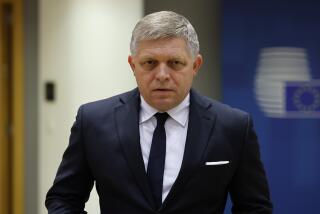The State as Stage Manager
- Share via
BRATISLAVA, Slovakia — Ladislav Chudik has always loved opening fan mail. Some even comes adoringly addressed to “Dr. Sova,” the gentlemanly surgeon he portrayed in a hit 1970s television series.
So it was with considerable agony that Chudik recently displayed a bundle of correspondence tucked away in his dressing room at the Slovak National Theater. These letters were different--so ghastly that their very mention drained the life from his smile.
“A swine like you will always be a swine,” one postcard cursed. “You are a parasite. You are a Judas. . . . You deserve to be hanged.”
The vitriol was unsparing, including vulgar references to Chudik’s mother and his Czech wife. “Slovakia will s--- on your grave,” an anonymous author scowled.
Fifty-three years in the theater, Chudik said, fidgeting to return the fresh batch of mail to its hiding place, but never anything like the last few months. Never so much hatred.
Chudik is a leader of Let’s Save Culture, a newly formed group of Slovak actors and artists opposed to the cultural policies of the Slovak government. And like most critics of ironfisted Prime Minister Vladimir Meciar and his allies, the veteran performer is learning that freedom to disagree in Europe’s newest capital comes at a steep price.
“In 1989, there was a tree in Wenceslas Square where [Communists threatened] I would be hanged as a warning to the others,” Chudik said, referring to the meeting place in Prague, then the Czechoslovak capital, where opponents of communism staged their revolution that year. “It never occurred to me that seven years later, in a free and independent Slovakia, I would be subjected to even worse things.”
At 72, Chudik is an unlikely repeat revolutionary. But that is exactly how he and hundreds of actors, singers, directors and other activists regard themselves as the Slovak artistic world once again takes on the powers that be.
This time their target is not communism, but rather a democratically elected government whose underhanded tactics are slowly turning Slovakia into a pariah among the new democracies of Eastern Europe.
*
The Meciar government, now in its third incarnation, has been methodically stamping out dissent--from the halls of parliament to university classrooms to the studios of public television--for the better part of this decade.
“United States support is for a Slovakia that is democratic not only in its electoral process but also in its laws, their implementation, and in its preservation of individual rights, including the right to disagree without being considered an enemy of the state,” U.S. Ambassador Ralph R. Johnson said in an unusually blunt public lecture to the Slovak Foreign Policy Assn. in October.
But when Meciar’s artistic point man, Culture Minister Ivan Hudec, turned his attention last summer to the venerable Slovak National Theater--a place Meciar once characterized as “a workplace of the opposition”--he picked himself an unexpectedly bruising fight.
Hudec dumped the popular head of the drama department--over the objections of the National Theater’s general director--under a new regulation that gives the ministry the direct power to hire and fire.
He later sacked the general director, naming in his place a longtime employee who was an unsuccessful parliamentary candidate for Meciar’s Movement for a Democratic Slovakia.
“What you have here is a political struggle between the ruling coalition and the opposition,” said Jozef Gerboc, who oversees 24 state-run theaters for the Ministry of Culture. “Often very banal things are involved, but the opposition exploits them to try and win the sympathy of the public.”
Communist-era dissident Martin Porubjak, a program director at the National Theater, acknowledged that many employees sympathize with the political opposition.
But the points of contention, he said, are not banal; the Meciar government, he said, is trying to exert control over the artistic community in a manner reminiscent of the Communist authorities.
The Ministry of Culture, for example, does not overtly dictate plays that should be performed or actors who should get parts; not even the Communists were that transparent, Porubjak said. But by establishing administrative and financial structures dependent upon the ministry and by placing loyalists in key positions, the ministry rewards artists friendly to the government, he said.
“Essentially, Meciar wants to have his own theater the way he has his own television,” Porubjak said. “Very few people actually go to the theater, but actors are very popular, and people listen when they speak. The influence of these people is very unpleasant for Meciar.”
A rally organized last month by Let’s Save Culture drew more than 20,000 people into the streets of Bratislava, many of whom jingled keys and chanted “Death to dictatorship!”--forms of dissent made popular during anti-Communist demonstrations.
Several weeks earlier, another rally attracted 10,000 marchers. In October, actors staged a 24-hour strike at the National Theater, and several prominent performers, including Chudik, canceled their contracts in a showy gesture of discontent.
Let’s Save Culture, meanwhile, has registered as an official nonprofit organization and last month published a scathing collection of essays detailing attempts by the Ministry of Culture to squelch independent artistic expression through financial and administrative meddling.
*
“The events of November 1989 were set off by the activities of artists, and the current government knows that well,” said Ladislav Snopko, a former Slovak minister of culture who directs a cultural center in Bratislava’s largest housing complex. “Now they can see clearly that the revolution is still going on.”
The revolt forced a partial retreat by Meciar. Hudec temporarily reinstated Peter Mikulik as head of the 52-actor drama department at the National Theater, which has opera, ballet and drama divisions.
It was Mikulik’s sudden firing last summer, after five years on the job, that set off the turmoil and led to the October strike.
But Mikulik’s boss, also fired in recent months, did not get his job back, and Mikulik will keep his post only until a replacement is chosen through an open competition. In the meantime, opera director Juraj Hrubant has been let go, and the theater’s new general director is in firm control--Miroslav Fischer, the former parliamentary candidate from Meciar’s party.
“The political dividing line goes vertically and horizontally through all of Slovak society, including this theater,” said Chudik, speaking in his cramped dressing room No. 213, which he still uses despite having quit. “We see it as fighting against a one-party state. They see it as consolidating their power.”
Publicly, the Meciar government has reacted to the insurrection with characteristic venom.
It has derided the protesters as “third-rate” actors and questioned their patriotism, particularly since many of them opposed the split-up of Czechoslovakia four years ago.
Top government officials have also complained that too few of the National Theater’s productions are written or composed by Slovaks.
“If they want to kiss arses in Prague, let them do so, but they shouldn’t call it Slovak culture,” Meciar reportedly remarked about the Bratislava production of a Czech play.
When tenor Peter Dvorsky protested government interference by quitting the opera house two months ago, Culture Minister Hudec hinted that Slovakia’s most famous singer was past his prime and unable to perform because of health problems. A pro-government newspaper suggested that Dvorsky had mishandled the finances of a foundation he heads.
The alleged financial irregularities were never substantiated, and Dvorsky has announced engagements in Austria, Japan, Switzerland and the Czech Republic. “I am not ending my singing career,” the tenor assured journalists.
Chudik’s decision to leave the theater was similarly scoffed at.
Meciar described the doyen of Slovak stage and screen actors as “an ill man” who was being manipulated by the opposition. In an interview, a top Ministry of Culture official said Chudik, who served as the first Slovak culture minister after the changes of 1989, had fallen victim to his own incompetence.
“All of the ministry’s administrative shortcomings continued during his tenure,” said Pavol Stevcek, general manager for planning. “He did nothing to do away with the problems. Now, ironically, his protests against the ministry are actually protests against himself.”
Unlike some of its previous crackdowns on intellectuals, the Meciar government’s intrusion into Slovak cultural life has acquired extraordinary significance outside Slovakia because it is seen as following a pattern of highhandedness at a time when European and U.S. officials are scrutinizing potential new members of Western institutions.
*
Parliament this month approved a bitterly disputed anti-subversion law that critics say could be used to suppress civil rights and clamp down on the country’s restless Hungarian minority. Only after strong objections were raised both in and outside Slovakia did the government delete a provision making it a crime to spread false information about Slovakia abroad.
In another incident, a prominent legislator’s home was bombed early this month after he was stripped of his parliamentary seat by the ruling party. Frantisek Gaulieder, a founding member of the Movement for a Democratic Slovakia, had quit the party in November to protest its undemocratic tendencies.
No official link to Meciar has been proved, but Gaulieder and opposition leaders allege the attack was an act of political intimidation. Western diplomats are also suspicious.
“It was wrong and brutal and an indication of a broader trend,” one diplomat in Bratislava said.
In a speech to parliament, Slovak President Michal Kovac--once an ally of Meciar but now his chief rival--described the Gaulieder bombing as “a telling example of the growing political violence that violates all written and unwritten rules of democratic life” in Slovakia.
As Kovac spoke, a bomb threat was telephoned to parliament, which was already half empty because the ruling coalition routinely boycotts his speeches.
Last year, the president’s son was kidnapped and dumped in a drunken stupor in Austria; though the case remains unsolved, the Meciar government has refused to pursue it.
Frustrated by the ineffectiveness of diplomatic arm-twisting, U.S. and European officials have begun issuing public warnings to the government.
If things don’t change, Western diplomats say, Slovakia risks being left out of the North Atlantic Treaty Organization and the European Union. Increasingly, even that prospect seems to carry no weight.
The protesting artists from Let’s Save Culture doubt that their efforts can reverse the tide any time soon. But the veterans of 1989 could not live with themselves if they did not at least try.
“Theater has to be opposition,” Chudik said. “It serves as the classic Shakespeare mirror.”
More to Read
Sign up for Essential California
The most important California stories and recommendations in your inbox every morning.
You may occasionally receive promotional content from the Los Angeles Times.










